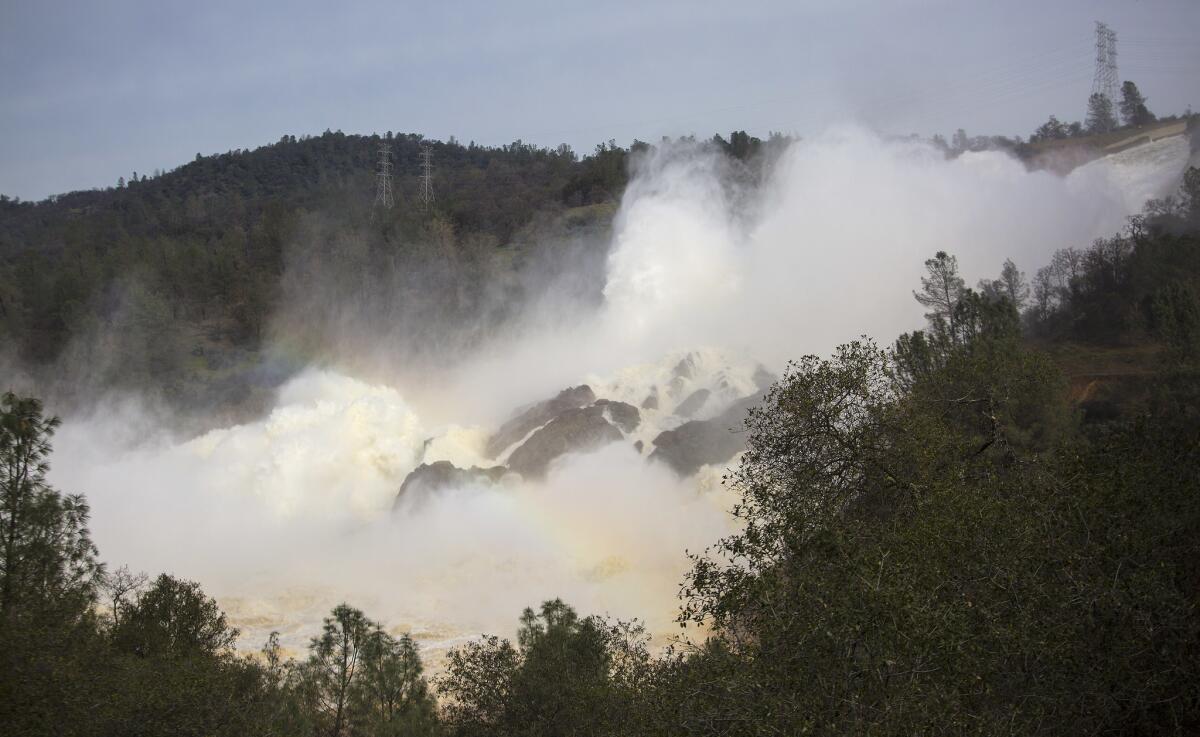Trump administration, in a reversal, OKs more funds for Oroville Dam repairs

- Share via
The federal government has agreed to reimburse California more than $170 million for repairs to the Oroville Dam spillway after an appeal from a state agency, officials said.
The assistance, part of a request from the California Department of Water Resources to the Federal Emergency Management Agency for recovery funding, was initially denied last year.
But on Thursday, the Trump administration reversed itself and agreed to help with more of the dam spillway’s rebuilding, bringing FEMA’s potential overall assistance to more than $562.5 million.
“DWR is grateful to FEMA staff for their time, dedication and continued support over the past three years,” said Department of Water Resources spokeswoman Erin Mellon. “The state will continue to review FEMA’s response and decide next steps regarding remaining costs in the coming weeks.”
In February 2017, the Oroville Dam was threatened amid the wettest winter since before the drought. Dam operators used the dam’s spillway, a long concrete chute that carries water into the Feather River, when the spillway became compromised by previously undiscovered construction and maintenance flaws.
But because water continued to pour into the lake, the state had to continue to release water down the damaged spillway in an attempt to prevent it from overflowing, but it didn’t work.
The dam overflowed, sending water onto its “emergency spillway,” an earthen slope next to the concrete spillway. That spillway too was flawed, and the rushing water ate away at the ground until it threatened the dam itself, forcing Butte County officials to initiate an evacuation of more than 180,000 people downriver.
Although the dam ultimately held up, the damage to its two spillways was catastrophic. Both had to be reconstructed at an estimated cost of $1.1 billion. The work is still underway, but the main spillway has been reconstructed and was used during last year’s rainy winter.
The reconstructed spillway can handle water flowing at a rate of 270,000 cubic feet per second, though officials say they never anticipate having to release water at such a high volume at one time.
The massive spillway reconstruction required pouring more than 1.2 million cubic yards of concrete — enough to fill 372 Olympic-size swimming pools. The main spillway alone contains enough concrete to build a sidewalk from Oroville to Amarillo, Texas.
An analysis of the main spillway’s failure in 2017 pointed to a series of questionable decisions during construction, including relying on relatively thin layers of concrete around vital joints, poor drainage for water that seeped into the chute and weak reinforcements.
A report released in January 2018 by an independent forensic team organized by the Assn. of State Dam Safety Officials contended that the dam’s owner, the Department of Water Resources, was “significantly overconfident and complacent about the integrity of its State Water Project civil infrastructure, including dams.”
The report found that periodic inspections of the spillway failed to identify the original design flaws and the subsequent deterioration of the spillway’s integrity. Officials say those issues were fixed with the reconstruction project.
Rep. Doug LaMalfa (R-Richvale), said in a statement he appreciated FEMA’s assistance and that dam stability should be a priority for the government.
“In the future, I hope that the Federal Energy Regulatory Commission and DWR will work together to ensure that our dams are up to date with modern engineering standards,” LaMalfa said. “I look forward to continuing to work with all parties to ensure the safety of our area and our water supply.”
More to Read
Sign up for Essential California
The most important California stories and recommendations in your inbox every morning.
You may occasionally receive promotional content from the Los Angeles Times.











